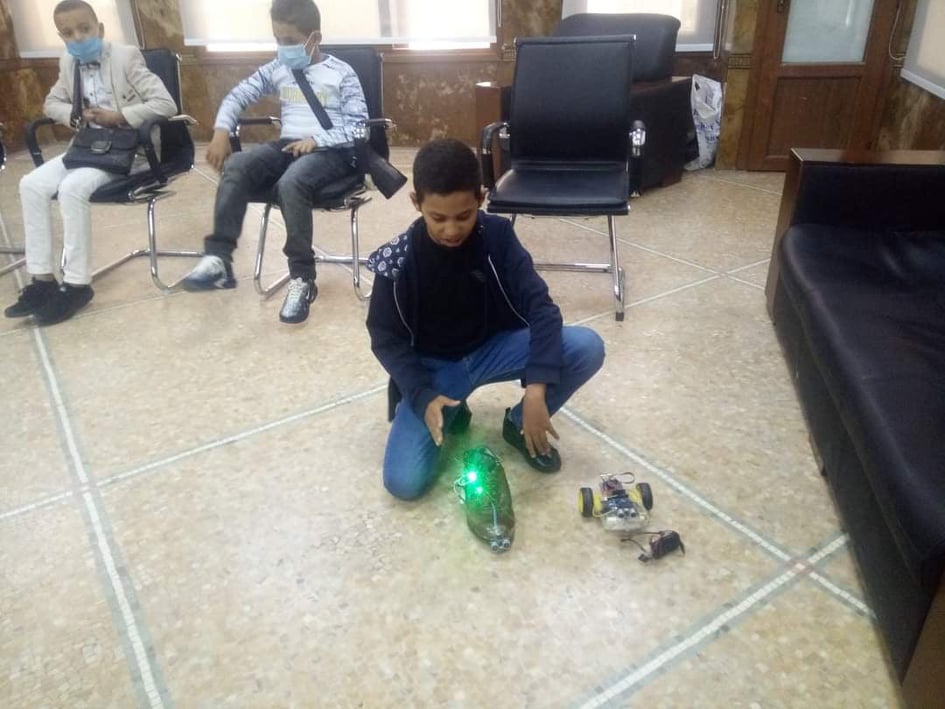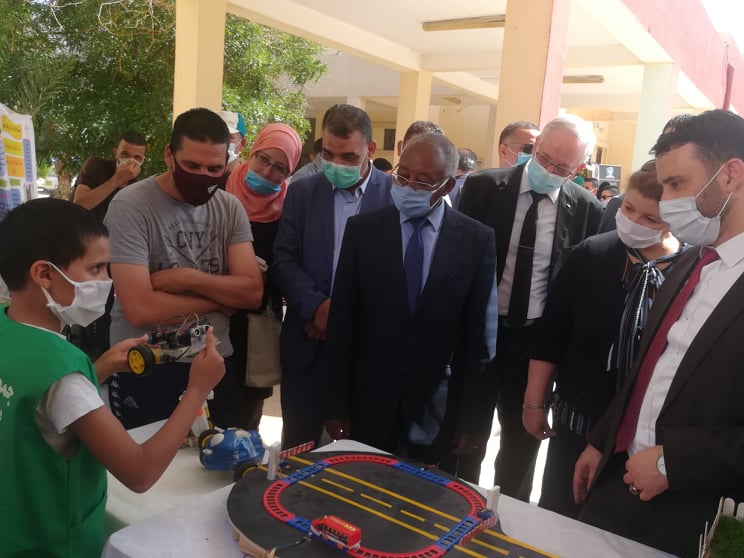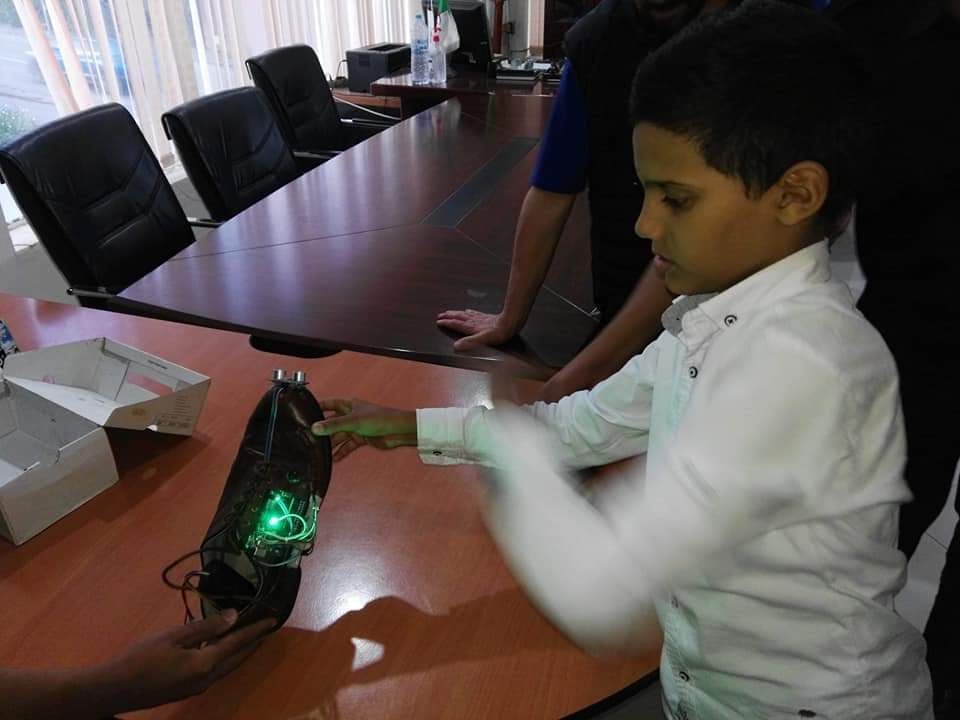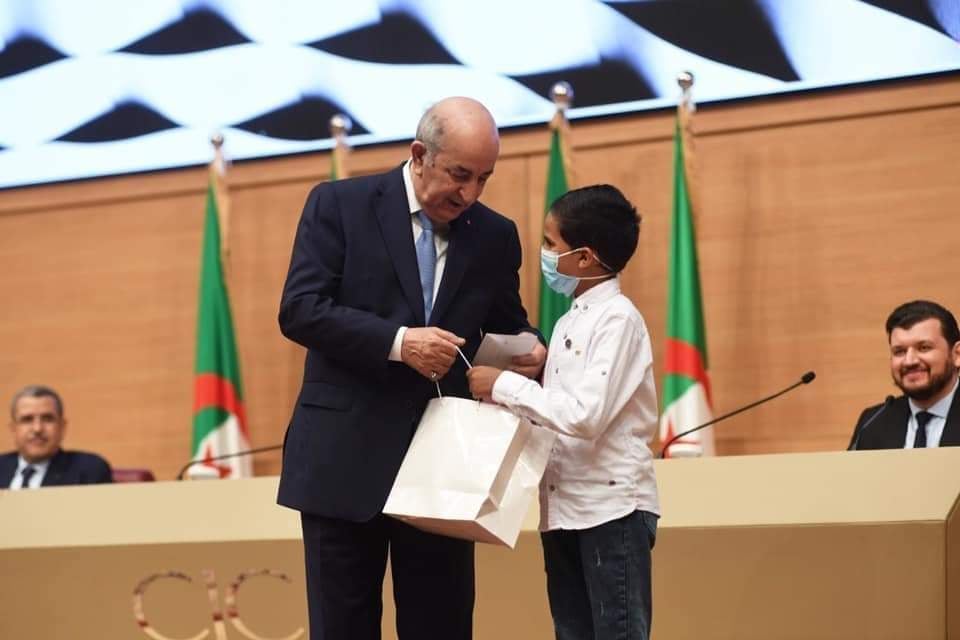12-year-old Algerian invents smart shoes to help blind people

Riad Mazouzi / Algeria
On his way to school, a 12-year-old child from the M’Sila Province, south of Algeria, named Hamdini Wael Shihab Al-Din usually encounters some blind people. Those blind individuals always find it difficult to walk and often they have accidents every now and then.
Watching them suffering has stirred sympathetic feelings within this child who started to think about inventing smart shoes that could protect the blind from having accidents in a way that enable them to walk safely as if they were well-aware of their surroundings.
Early Beginnings … Taking Apart & Rebuilding Toys

Wael Shihab Al-Din’s family consists of six members: his parents, two brothers and a sister. The family lives in a residential area at the center of M’Sila city. And once in one of the rooms in his house, this child entered the world of innovation and invention through taking apart and rebuilding toys. What’s more, he began fixing the damaged toys, especially those electric and battery-powered ones.
According to Tiny Hand, Wael dedicates most his time to figuring out how to refix the technical and electrical damages of those toys. Furthermore, his passion drives him to even stay up late at night for this purpose as he took it upon himself not to rest until he could successfully repair those damages.
Smart Shoes

Ever since he came up with the idea, Wael Shihab Al-Din’s effort was considerably devoted to implementing the project of “The Smart Shoes for the Blind”. At that time, he spent most of his time alone either at home or at the headquarters of the technology-centered association to which he had joined earlier to develop his innovative capabilities.
Wael asserted that the idea of carrying out his project took nearly three weeks. Yet, he said, “It took much time for me to brainstorm and plan for the idea to be well-aware of everything. And that lasted for more than two years because the idea was in my mind, but the challenge lied in how to effectively and properly implement it. However, assembling materials and putting pieces together in the shoes did not take long.”
During the stage of the initial experiments, the idea was initially implemented by using the shoes of Wael’s father. The shoes were connected to all the necessary technological particles, sensitive motion sensors and tools to alert to potential dangers on roads.
As for the components constituting the shoes, Wael noted that “these smart shoes contain Arduino, experimenting panel, distance sensor, and wires. And through ultrasound waves, the ring inserted into a pair of smart shoes goes off when the shoes’ wearer is 2 meters away from a barrier.”
As for the shoes’ work and time efficiency, Wael said, “the system of the shoes is equipped with a tiny battery which can be electrically charged by a special charger before usage. Besides, in the event of full charging, a blind person would be able to use the shoes for approximately three full days.”
In Smart Glasses Lies the Challenge
After succeeding in inventing the smart shoes for protecting the blind against potential accidents or injuries, this little genius seems to be determined not to stop at this phase. Rather, he wants to develop his invention into something else, that is, smart glasses dedicated to helping the blind.
When he was a little school boy, Wael started to think about smart glasses, their essential components and how to implement the whole idea. He added that this innovation, in terms of technology and structure, will be to a great extent similar to that of the smart shoes. However, smart glasses will be smaller in size and greater in effectiveness.
Presidential Honor

This little genius has gained appreciation from many, including his parents who supported him in his initial attempts of invention, his teachers who motivated him, and the electronics-centered Association for Creativity and Innovation in M’Sila which also supported him.
Additionally, Wael, at various occasions, has been greatly encouraged and supported by previous state governors, and several ministers, including the Minister of Youth and Sports, the Minister of Vocational Training, the Deputy Minister in charge of Incubators, and the Deputy Minister in charge of Start-ups.
On the 3rd of this October, Wael received the greatest honoring ceremony he ever had during his path of creativity. This was because Algerian President Abdelmadjid Tebboune himself supervised the ceremony of honoring the creative children aged under fourteen; and luckily, Wael came first.
President Tebboune was so proud of what Wael did and considered it a great and honorable achievement for the Algerian Government. According to Wael, the president said to him in the backstage of the ceremony, “I wish I will meet you here again, so you can surprise us with another invention of your own in the near future.”
In a speech delivered to the attendance, the president promised to help and support every creative child for the promotion of kids’ inventions and connecting them with the world of manufacturing and innovation for the benefit of the country.
Wael completely refuses any foreign offer for manufacturing the smart shoes. Rather, he prefers his innovation will be developed and manufactured in Algeria with the help of the Algerian technological specialists.
Genius Dream
Wael Shihab Al-Din hopes he would be able to continue learning and digging into the world of technology and innovation until he becomes an Algerian super genius. He hopes so because he aims at bringing honor and world appreciation to his country in the first place, and to the whole world in the second place. Wael is regarded as a masterpiece for the electronics-centered Association for Creativity and Innovation in M’Sila.
His passion and interest in innovation has never negatively affected Wael’s academic duties as a student. He is still studying and gets good marks in exams. Commenting on his academic achievement, he said, “My passion and interest in innovation never had a negative impact on my studies because I maintain a perfect balance between the two.”
Finally, Wael advised children who are at his age not to waste their time on useless practices such as playing electronic games and similar activities. He also advised them to make the best of their time for the betterment of their education and future, especially by being competent in foreign languages, technology, and invention.

